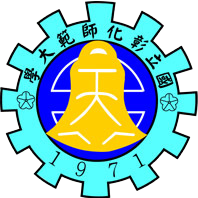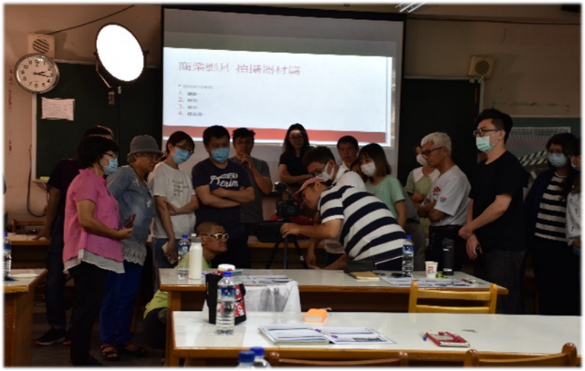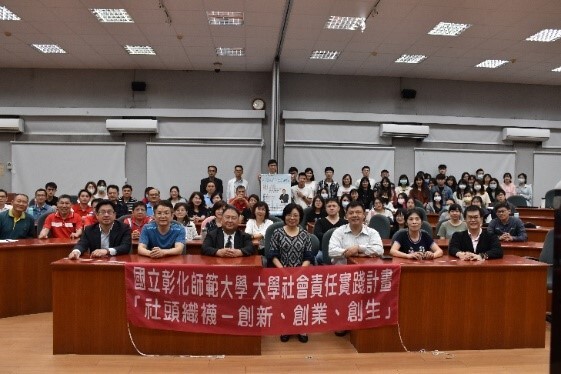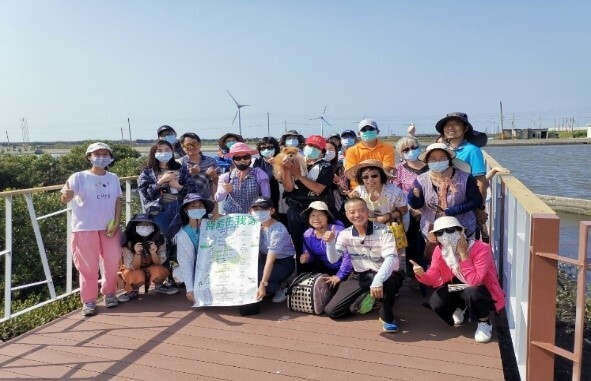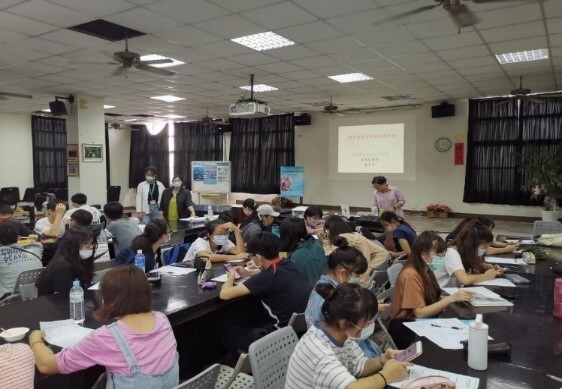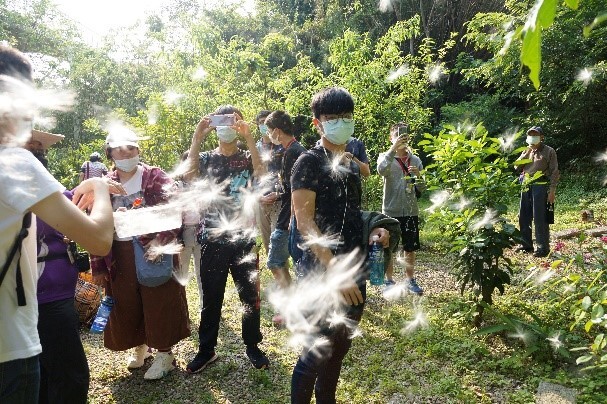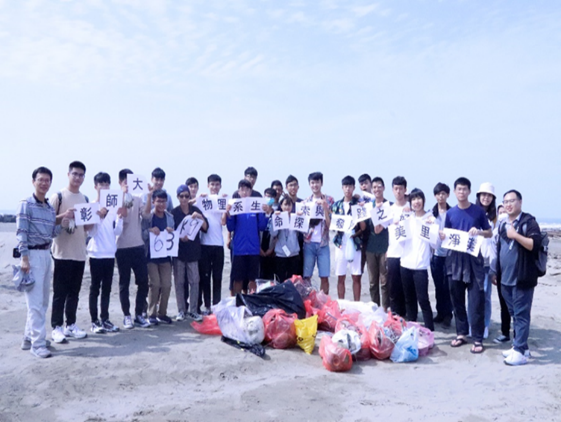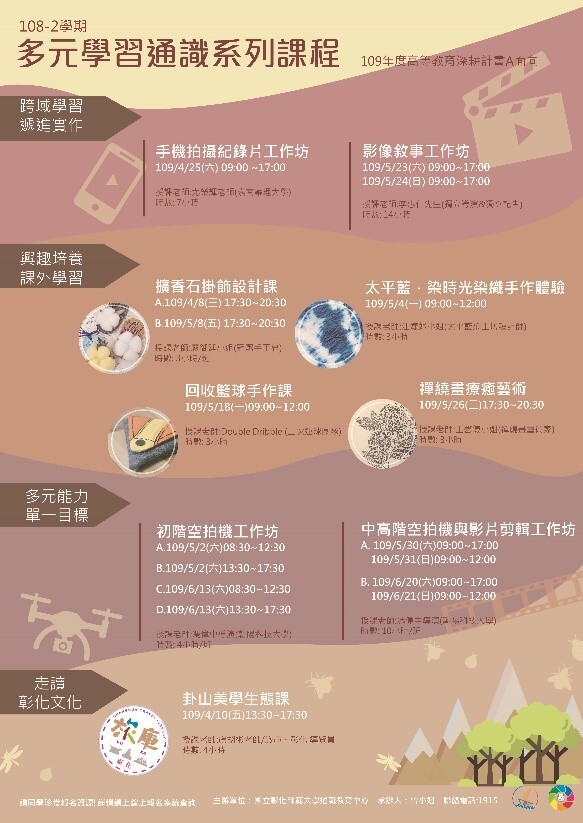SDG17.4.1 Education for SDGs commitment to meaningful education-2021
1. The university’s social responsibility practice programme called ‘Shetou Sock Production: Innovation, Start-up, and Revitalization’ aims to promote the upgrading of the sock production industry in the Shetou township in Changhua. With the help of academic and practical experts, we jointly solved problems faced by sock manufacturers, and our professional teachers took student teams to sock manufacturers to conduct training; study problem-solving; and assist manufacturers in upgrading, transforming, and brand modelling activities. In 2020, seven training workshops of various types were held, including 346 participants. In addition to training industrial talent, this programme promotes students at NCUE to develop professional skills and understand the field of practice, as shown in Figures 1 and 2. Please refer to Annex 17.4.1A for supporting information. See the website of the Shetou Sock Production USR programme: http://usr.im.ncue.edu.tw/index.html#space2.
|
Workshop on shooting commercial films |
Enterprise sustainability and brand image |
2. In view of the sudden decline in clams and aging of the industrial population, the university’s social responsibility practice programme called ‘Deeply Cultivate Flower Gardens, Join Hands with Great Cities: Sustainable Industry and Environment in Changhua Twin Cities’ has cooperated with the Changhua County Aquaculture Association. They have also signed a letter of intent to cooperate with the Aquaculture Department of the National Taiwan Ocean University as well as invited clam culture experts from this department to provide in-depth guidance. Professor Hung-chih Lai of the Department of Hydrobiology, National Chiayi University, who has expertise in water quality and sediment analysis, has also helped solve the sudden decline in clams. At the same time, our students have helped solve local problems, helped local fishers develop their skills in a friendly environment, gained experience in production and marketing, and encouraged young people to return to their birthplaces to seek employment and start businesses. In 2020, 24 workshops were related to the aquaculture industry and local cooperation, as shown in Figures 3 and 4, with 767 participants. Please refer to Annex 17.4.1B for supporting information. Website: https://www.facebook.com/NCUEUSR.
|
Environmental education course on green energy |
Local workshop on common fish and their diseases |
3. The university’s social responsibility practice programme called ‘Baisha × Common Good Education: Programme of Deeply Cultivating Twelve-year National Education in Remote Rural Areas’ has helped address the learning gap in education in rural areas by providing quality education to reduce inequalities. The teaching team at NCUE led 94 teachers to seven rural junior high schools and primary schools in four counties and cities for a one-week camp during the summer vacation. In addition to the three teacher training courses, namely, ‘Secondary Education Practice and Service Learning’, ‘Interdisciplinary Teaching Application and Practice’ and ‘Teaching Professional Practice’, the summer camp held five empowerment workshops with 282 participants and seven student–community meetings with 110 participants. It also produced cross-domain or interdisciplinary collaborative teaching plans. Please refer to Annex 17.4.1C for supporting information. See the website of the Baisha × Common Good Education USR programme: https://sites.google.com/gm.ncue.edu.tw/ncue-teach/%E9%A6%96%E9%A0%81.
4. The educational goal of the Common Knowledge Education Centre at NCUE is to develop students’ extensive and broad knowledge base and wisdom to pursue the meaning of life’. Further, it adopts ‘cultural literacy’, ‘scientific literacy’, ‘devotion to practice’, ‘original thinking’, ‘civic literacy’, and ‘global village mind’ as the literacy courses, in combination with the United Nations Sustainable Development Goals. In the 2019–2020 academic year, courses such as Overview of Marine Culture, Water Resources and Human Civilization, Marine Culture and Taiwan, Understanding the Water Environment, Introduction to Marine Life Science, Introduction to Energy, Green Energy Technology, Hydropower Energy Saving and Modern Life, Introduction to Green Building, Environmental Change, and Human Civilization were offered. According to SDG6 (Clear Water and Sanitation) and SDG7 (Affordable and Clean Energy), students’ awareness of the sustainable development of water resources and clean energy was strengthened. In addition, to enhance students’ experience, we set up the Coastal Ecological Resources Sustainability Workshop (Taijiang National Park in Tainan City), Walk and Read Changhua Culture-Fubao Ecological and Marine Culture Experience, Marine Conservation Education-From Plastic Picking to Plastic Reduction, Biodiversity Conservation Concept Activity, Core Literacy of Environmental Education, Power Generation Technology and Pollution Discharge (Coal, Wind and Solar Power Generation), Marine Conservation Beach Cleaning Education Course-From Plastic Picking to Plastic Reduction, Environment Introduction/Industrial Culture/Resources Sustainability, and other diverse learning courses. Through learning by doing as well as arranging field visits, lectures, and services, students could fully understand the importance of environmental sustainability, as shown in Figures 5 to 7.
|
Diverse learning course: Walk and Read Changhua Culture - Guashan Aesthetic Ecology Course |
Life Exploration Development and Practice Course Implementation - Marine Conservation Beach Cleaning Activity |
|
|
FPoster of the common knowledge diverse learning series |
||
- Annex 17.4.1A- Highlights of the implementation of ‘Shetou Sock Production: Innovation, Start-up and Revitalization’
- Annex 17.4.1B- Highlights of the implementation of ‘Deeply Cultivate Flower Gardens, Join Hands with Great Cities: Sustainable Industry and Environment in Changhua Twin Cities’
- Annex 17.4.1C- Highlights of the implementation of ‘Baisha × Common Good Education: Programme of Deeply Cultivating Twelve-year National Education in Remote Rural Areas’
